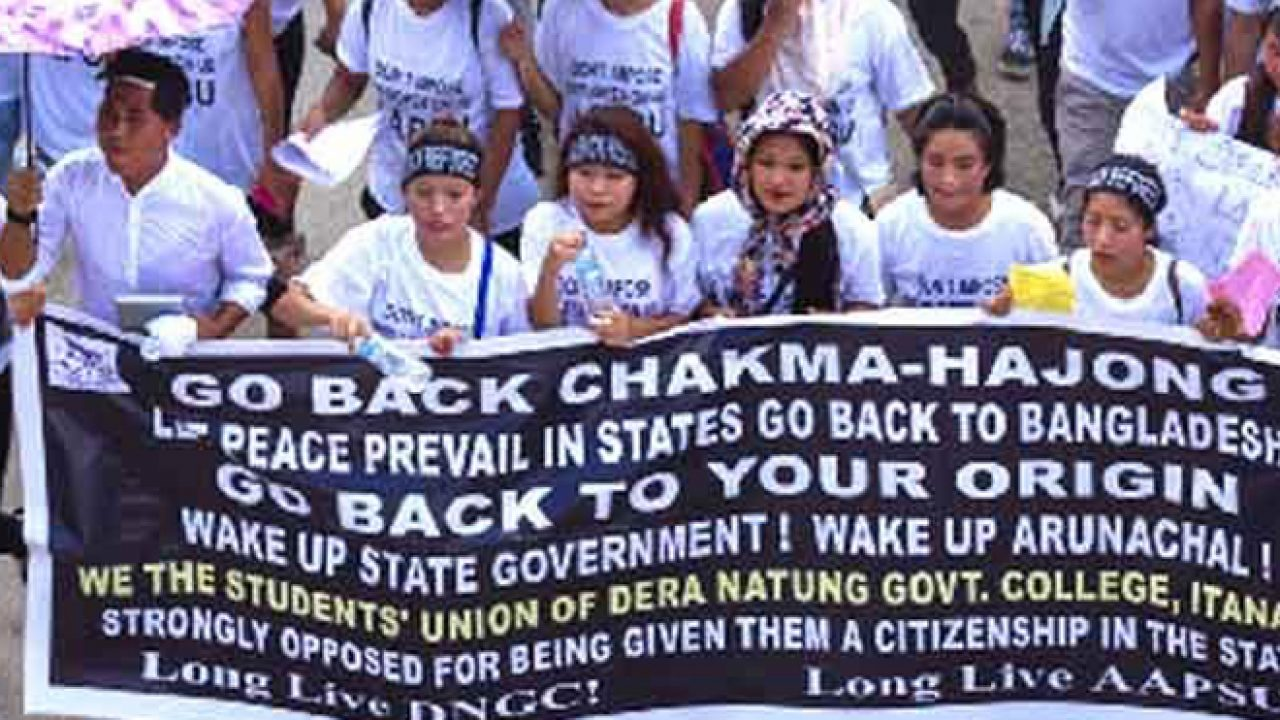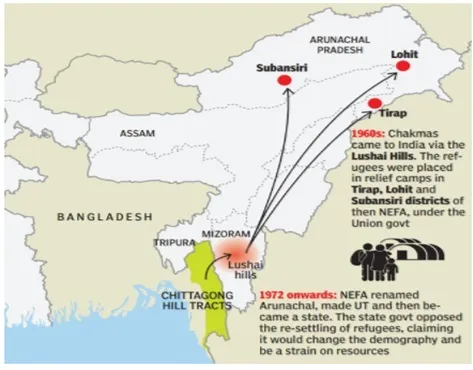Description

Copyright infringement not intended
Context - NHRC tells the Centre to confer citizenship to eligible Chakmas and Hajongs.
Details
- The National Human Rights Commission directed the Union Government and the Arunachal Pradesh government to confer citizenship to eligible members of the Chakma and Hajong communities.
- The Chakmas and Hajongs communities had once lived in the Chittagong Hills Tracts of East Pakistan, which is now Bangladesh.
- They fled their homes when their land was submerged by the Kaptai dam in the 1960s.
- The Chakmas are Buddhist.
- The Hajongs are Hindus.
- Both had faced religious persecution in Bangladesh.
- After they migrated to India, the government settled a majority of them in Arunachal Pradesh.
- In 2015, the Supreme Court of India had asked the Union Government to grant citizenship to the Chakma and Hajong refugees.
- Several organisations and civil society groups in Arunachal Pradesh were against it, saying the decision would change the demography of the state and affect the minority status of the tribal population.

Copyright infringement not intended
National Human Rights Commission
- The National Human Rights Commission is a statutory body established in 1993 under the Protection of Human Rights Act, 1993.
- The commission works as the watchdog of human rights in the country.
Composition of the Commission
- The commission is a multi-member body consisting of a chairman and four members.
- The chairman should be retired chief justice of India, and members should be serving or retired judges of the Supreme Court, a serving or retired chief justice of a high court and two persons having knowledge or practical experience concerning human rights.
- In addition to these full-time members, the commission also has 4 ex-officio members;
- The chairman of the National Commission for Minorities.
- The National Commission for SCs.
- The National Commission for STs.
- The National Commission for Women.
- The chairman and members are appointed by the president on the recommendations of a 6-member committee consisting of;
- The Prime Minister is the head.
- The Speaker of the Lok Sabha.
- The Deputy Chairman of the Rajya Sabha.
- Leaders of the Opposition in both the Houses of Parliament.
- The Central home minister.
- The chairman and members hold office for a term of five years or until they attain the age of 70 years, whichever is earlier.
- The salaries, allowances and other conditions of service of the chairman or a member are determined by the Central government. But, they cannot be varied to his disadvantage after his appointment.
- After the tenure, the chairman and members are not eligible for further employment under the Central or state government.
- The President can also remove the chairman or any member on the ground of proven misbehaviour or incapacity.
- However, in these cases, the president has to refer the matter to the Supreme Court for an inquiry.
- If the Supreme Court, after the inquiry, upholds the cause of removal and advises so, then the president can remove the chairman or a member.
Functions of the Commission
- Inquire into any violation of human rights or negligence in the prevention of such violation by a public servant, either suo motu or on a petition presented to it or on an order of a court.
- Intervene in any proceeding involving an allegation of violation of human rights pending before a court.
- Visit jails and detention places to study the living conditions of inmates and make recommendations.
- Review the constitutional and other legal safeguards for the protection of human rights and recommend measures for their effective implementation.
- Review the factors including acts of terrorism that inhibit the enjoyment of human rights and recommend remedial measures.
- Study treaties and other international instruments on human rights and make recommendations for their effective implementation.
- Undertake and promote research in the field of human rights.
- Spread human rights literacy among the people and promote awareness of the safeguards available for the protection of these rights.
- Encourage the efforts of non-governmental organisations (NGOs) working in the field of human rights.
- Undertake such other functions as it may consider necessary for the promotion of human rights.
- The Central government should inform the Commission of the action taken on the recommendations within three months.
- The commission submits its annual or special reports to the Central government and the state government concerned.
- These reports are laid before the respective legislatures, along with a memorandum of action taken on the recommendations of the commission and the reasons for non-acceptance of any of such recommendations.
Limitations of the Commission
- The functions of the commission are mainly recommendatory.
- No power to punish the violators of human rights, or to award any relief including monetary relief to the victim.
- Recommendations are not binding on the concerned government or authority.
- The commission has a limited role, powers and jurisdiction concerning the violation of human rights by the members of the armed forces.
Human Rights (Amendment) Act, 2006
- Reducing the number of members of State Human Rights Commissions (SHRCs) from five to three.
- Changing the eligibility condition for the appointment of a member of SHRCs.
- Strengthening the investigative machinery available with Human Rights Commissions.
- Empowering the Commissions to recommend the award of compensation, etc. even during the enquiry.
- Empowering the NHRC to undertake visits to jails even without intimation to the state governments.
- Strengthening the procedure for recording evidence of witnesses.
- Clarifying that the Chairpersons of NHRC and SHRCs are distinct from the Members of the respective Commission.
- Enabling the NHRC to transfer complaints received by it to the concerned SHRC.
- Enabling the Chairperson and members of the NHRC to address their resignations in writing to the President and the Chairperson and members of the SHRCs to the Governor of the state concerned.
- Clarifying that the absence of any member in the Selection Committee for selection of the Chairperson and member of the NHRC or the SHRCs will not vitiate the decisions taken by such Committees.
- Providing that the Chairperson of the National Commission for the Scheduled Castes and the Chairperson of the National Commission for the Scheduled Tribes shall be deemed to be members of the NHRC.
https://scroll.in/latest/1024413/confer-citizenship-to-eligible-chakmas-and-hajongs-nhrc-tells-centre-arunachal-pradesh?utm_source=rss&utm_medium=public












